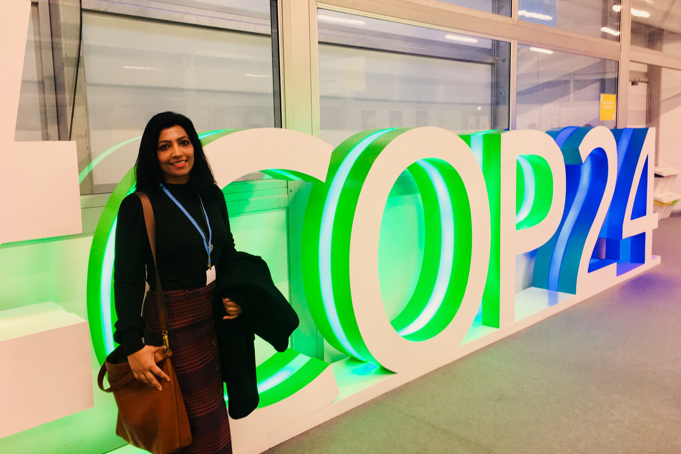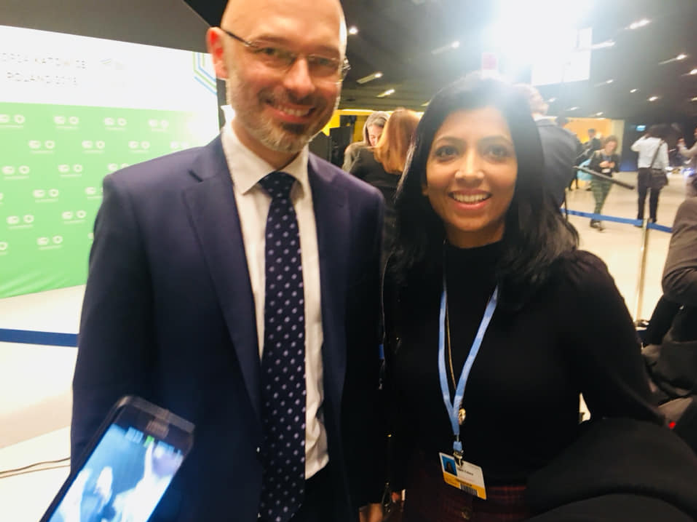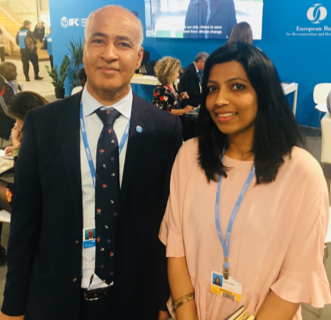
In December 2018, I had an opportunity to attend the 24th Conference of the Parties to the United Nations Framework Convention on Climate Change (UNFCCC) COP24. This serves as the formal meeting of the UNFCCC Parties to assess progress in dealing with climate change, and beginning in the mid-1990s, to negotiate the Kyoto Protocol to establish legally binding obligations for developed countries to reduce their greenhouse gas emissions.
It was a wonderful experience to attend such a high-profile conference with participants including government delegates, business development community leaders, scientists, university researchers, students, and representatives of non-profit organizations. In addition to the main negotiation sessions, there were several side events in the conference, which I attended to see the efforts and contributions of several countries to mitigate the serious impacts of climate change. I met several high officials from FAO, World Bank, ADB, PhD researchers from other universities and had an opportunity to briefly share my research on Climate Smart Agriculture. The most important and encouraging moment during the conference was when I met Mr. Malik Amin Aslam, The Federal Minister and Advisor to Prime Minister for Climate Change-Pakistan, who greatly appreciated my research as it is timely and much needed in the context of Pakistan. During this conference, I was also lucky to meet Mr. Michał Kurtyka, President-designate of COP24.

Photo: Mr. Michał Kurtyka, President-designate of COP 24 and Sajida Awan
I was interested in attending sessions that were relevant to my research topic: “Climate smart agriculture for food security and water scarcity.” The agriculture sector is highly affected by climate change, leaving a number of implications on global food security. Around 127 countries included agriculture as a priority area for climate action in their “Intended Nationally Determined Contributions” (INDCs) under the Paris Agreement. This year in COP24, it was interesting to see several new interventions and emerging research to promote climate smart agriculture.
I attended several sessions organized by EU, World Bank (WB), FAO and Global Alliance for Climate Smart Agriculture (GACSA). Most of these sessions particularly focused on the role of climate smart agriculture to achieve goals set under SDG13. In one of these events, FAO and WB highlighted the need of Building Knowledge on Climate-Smart Agriculture and E-learning. During this event, FAO launched four e-learning modules on water, soil, crops and livestock. during this session. I also came across another important side event where FAO launched their new publication (Climate Smart Agriculture Case Studies 2018) to highlighted successful climate smart agriculture approaches from different regions. All these sessions were very enlightening to understand the benefit of climate smart agriculture to the farming communities.

Deputy Director, Climate and Environment Division, FAO
A number of challenges and actions were identified to improve and effectively implement climate smart agriculture in developing countries like Pakistan. Some of these are highlighted below:
- There is a clear knowledge gap in several developing countries regarding climate smart agriculture, therefore there is a need for knowledge, building on climate smart agriculture.
- There is a missing link between global processes and local needs affecting the implementation of climate smart agriculture at the local level, which requires a more inclusive approach through the involvement of different stakeholders (i.e., farmers and civil society organizations).
- More focus is needed to link climate smart agriculture with gender equality and disaster risk reduction strategies.
This conference allowed me to learn about different innovative projects and interventions to mitigate climate change impact showcased by several organizations from all over the world. It was an excellent learning experience, an opportunity to network and explore several initiatives to improve climate smart agriculture implementation in developing countries.